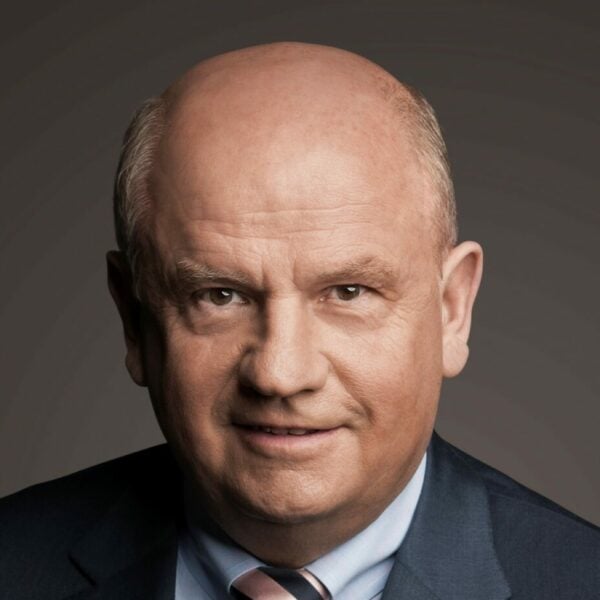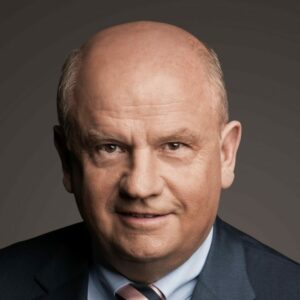
“AMERICAN UNIVERSITIES ARE MORE STRONGLY POSITIONED ON ISSUES OF THE FUTURE.”
Staufen AG spoke with Prof. Dr. h. c. Martin Richenhagen. The German-American manager was CEO of AGCO Corporation from 2004 to 2020 and today sits on the supervisory boards of Linde, Stihl and Daimler Truck, among others. Born in Cologne, he lives in the USA and has also been an American citizen since 2011.

Prof. Dr. H. C. Martin Richenhagen
Former AGCO CEO and today multi-supervisory board member

Prof. Dr. H. C. Martin Richenhagen
Former AGCO CEO and today multi-supervisory board memberRead more
Professor Richenhagen, your biography is titled “Der Amerika-Flüsterer” (The America Whisperer). Who did you have to whisper to more during your time as a manager – also as CEO of U.S. company AGCO from 2004 to 2020 – the Americans or the Germans?
The title is, of course, a bit exaggerated and also not from me, but from the publisher. After all, it was not my foremost task to “whisper” to America or Germany. But I will comment on transatlantic issues if that is desired. I always try to explain things and mediate between the two worlds. Formerly as CEO and now as chairman of the American Institute for Contemporary German Studies (AICGS) think tank in Washington.
Do you have an example of such mediation tasks?
When the current German President Frank-Walter Steinmeier was in Washington as the then Foreign Minister, we were able to persuade him to also come to Atlanta to see a university and two schools there. By the end of the day, it was clear that his previous perception of the American education system had changed significantly.
Tesla in Grünheide, soon Intel in Magdeburg – is Germany currently the favorite location for major US investments?
The American business community has always liked to invest in Germany. It is a solid location for U.S. companies with a similar legal framework. Americans, however, require a bit of explanation regarding employee participation in German companies.
Could the current geopolitical upheavals strengthen transatlantic economic ties?
I think so. The Americans have always had a much more distanced attitude toward Russia than Germany, for example. No one there could ever understand the dependence on Russian pipelines or the sale of German gas storage facilities to Gazprom.
While the USA sets the pace worldwide with tech companies such as Apple, Amazon, Google and Meta, Germany is still more synonymous with traditional industry. Is that enough for the future?
In sectors such as mechanical engineering or the automotive industry, the Germans still have a certain strength, even superiority. But that is crumbling. It is remarkable how such a strong automotive site as Germany could be left behind by a newcomer like Tesla. And a lot of additional competitors are moving in – especially from China.
Where do you think there needs to be a change of direction?
It’s all about education, first and foremost. U.S. universities are more strongly positioned on issues of the future. In addition, the financing of start-ups plays a crucial role. For example, we recently took the start-up Axios, of which I am Chairman, public in New York, even though the founders are German.
Is the mega topic of sustainability an opportunity for Germany to position itself as a global pioneer?
At the very least, the Greens justify the restrictive interventions in industry with the prospect of developing knowledge and new economic sectors. And the Germans are in fact already quite capable here in certain areas. I hope that this is an opportunity for Germany.
Back to the transatlantic relationship. Wouldn’t it be wise for the U.S. and Europe to develop a joint strategy regarding China?
We have not even managed to reach a trade agreement between the United States and Europe – the TTIP. I was involved at the time as Chairman of the German American Chamber of Commerce. When President Obama was ready to sign TTIP, we coordinated a meeting between him and Chancellor Merkel at the Hannover Messe. TTIP failed not because of the Americans, but because of the Germans.
But I still believe that we have to seize the opportunity to engage more closely with the Americans again. A joint China strategy? It would be worth the try.
What, then, needs to change in American political culture?
There are too few qualified and charismatic politicians with leadership potential. Moreover, in Germany we do not have a tradition of wanting to understand things in depth so that we can then talk about them sensibly and approach a joint solution. Instead, there is a “talk show culture.” Mostly the same people sit there, always regurgitating the same topics. That’s not political engagement!
The subtitle of your book can be translated into English as “My Path from German Religious Teacher to Top US Manager.” Do we need more people with such resumes?
I’ve always liked hiring people with broader experience. But it always depends on what the person has done. In other words, not a three-year sabbatical after graduating from high school, but, for example, self-employment while still a student. And that’s regardless of whether the company has made it economically or not. The Americans, by the way, handle the issue quite differently. Here, going bust doesn’t mean the end of your career.
Finally, what is your most important advice to the current generation of managers?
Never stop learning. I don’t do that either, even though I’ll be 70 this year. Take the example of Axios, which I have already talked about. The topic of a meat-free diet is practically up for grabs. Here, we in Germany have to become even more creative. But in Germany, the risks come first, while in the U.S. it’s the opportunities.
Magazine Article about
Prof. Dr. h. c. Martin Richenhagen
THE AMERICA WHISPERER
You might also be interested in

Lean in the USA
Staufen AG is also represented in the world‘s largest economy. Lean expert David Frost leads the US team as Senior Advisor. We introduce the „car guy“ in an interview.
Read more
Team Leadership and Performance
As a guest of the mexican manufacturer of home appliances (refrigerators, gas stoves, washing machines, dryers and air conditioners). Lean processes, shop floor management and a focus on value creation using the process facilitator concept to optimize production, increase efficiency and reduce waste. Moreover, employees are more satisfied because they are supported in their dayto-day work by a process facilitator (team leader) and can thereby better concentrate on their work and value creation. South America’s leading kitchen appliance manufacturer are mabe experienced this in its large mexican plants.
Read more
thyssenkrupp Elevator – Next level: Sales & Operations Planning
As an integrated business management process, Sales & Operations planning (S&OP) ensures a synchronous and autonomous corporate divisions. At the North American business unit of elevator manufacturer thyssenkrupp Elevator Victoria Frank and Brian McGovern together with Staufen.Inova have redefined the balance between supply and demand. The two US managers report in an interview what role Scrum played in this.
Read more